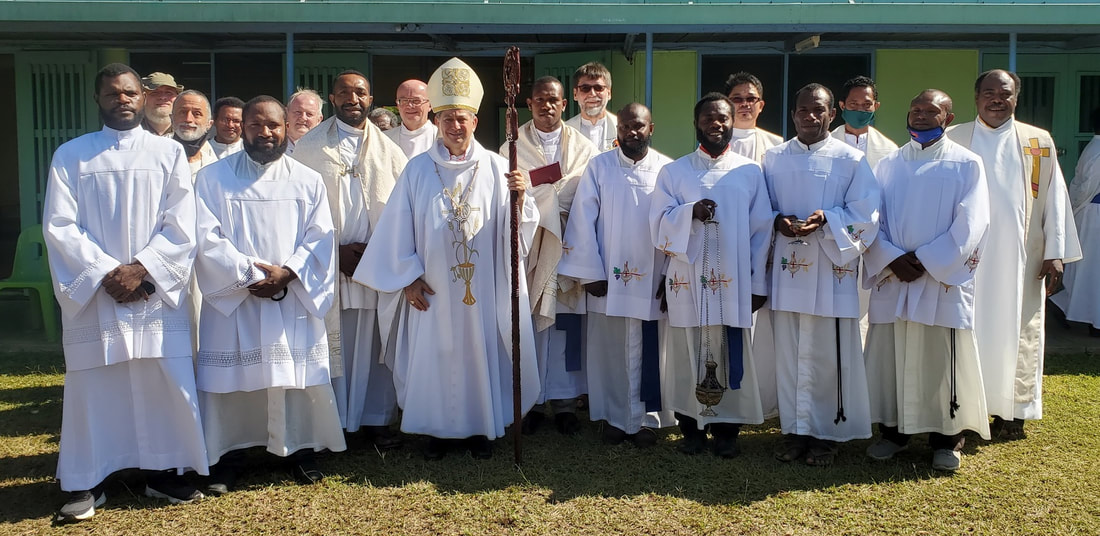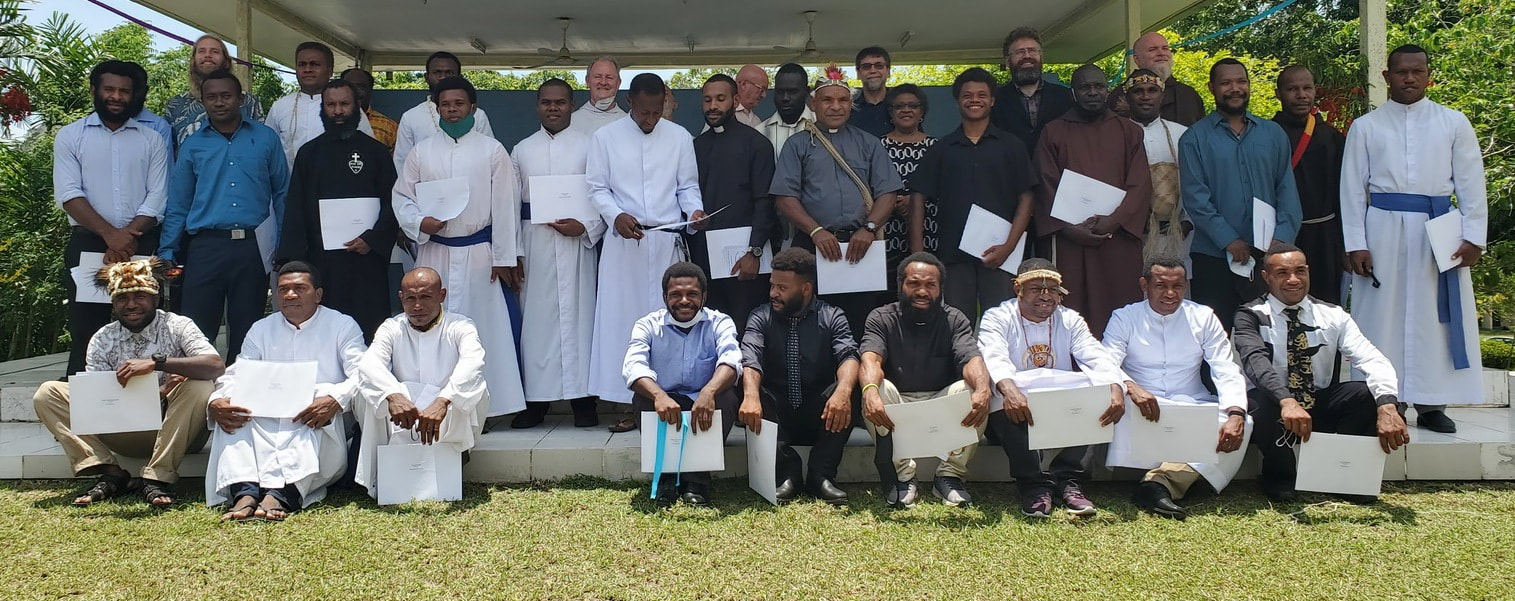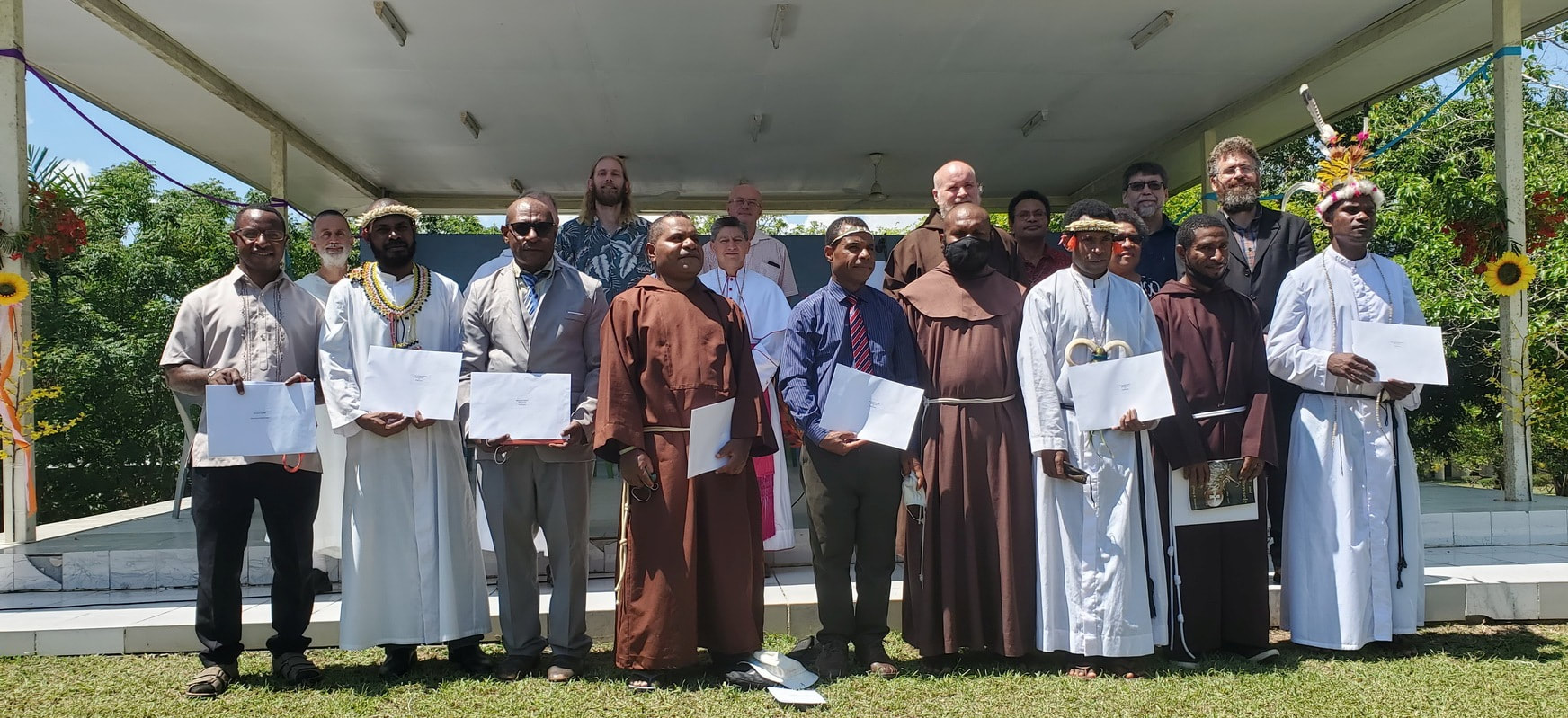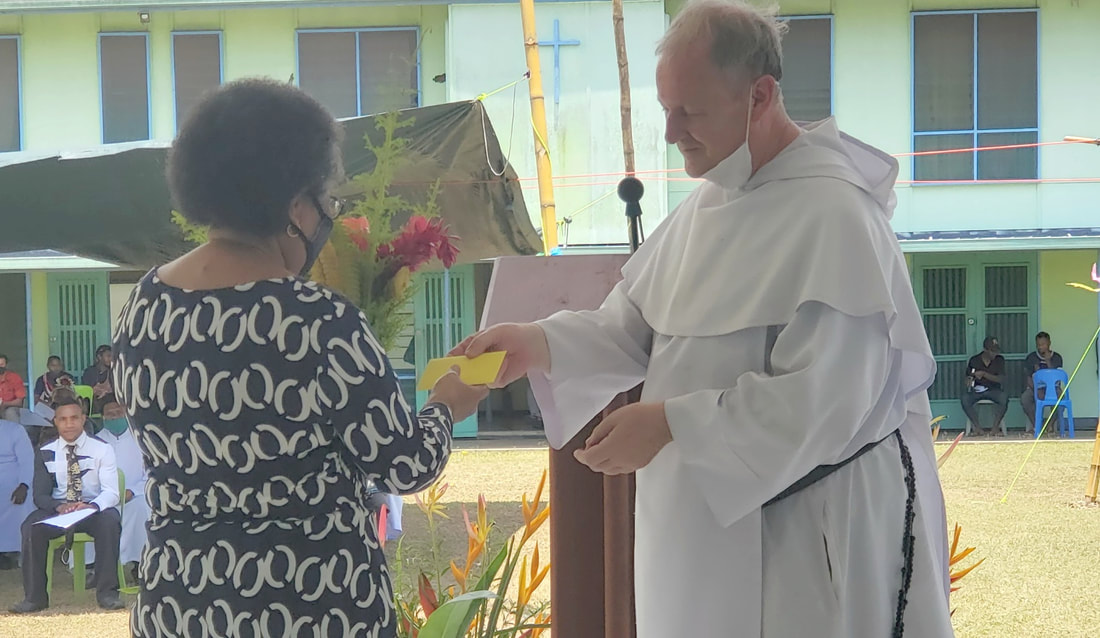Saturday, 13th November saw twenty-eight students graduate from CTI, in our first graduation ceremony since achieving registration and accreditation of our courses with DHERST, the Department Of Higher Education, Research, Science and Technology.
A Mass of thanksgiving was celebrated by the Apostolic Nuncio to PNG, His Excellency Fermín Emilio Sosa Rodríguez. Here we see the Nuncio with concelebrating priests and servers:
A Mass of thanksgiving was celebrated by the Apostolic Nuncio to PNG, His Excellency Fermín Emilio Sosa Rodríguez. Here we see the Nuncio with concelebrating priests and servers:
Due to Covid-19 regulations, permission was obtained for the Mass and graduation, with two separate graduation ceremonies (Philosophy and Theology), all in the open air and with attendees being arranged in groups of no more than 20. Masks were obligatory (being momentarily removed for photographs.)
The guest speaker was renowned PNG educator and former Vice-Chancellor of Divine Word University, Dr Cecilia Nambou. Below we see the Philosophy graduates immediately after their ceremony.
The guest speaker was renowned PNG educator and former Vice-Chancellor of Divine Word University, Dr Cecilia Nambou. Below we see the Philosophy graduates immediately after their ceremony.
And here are our Theology graduates:
The ceremony was also notable as a farewell to the out-going President of CTI, Fr Joseph Vnuk, O.P., and a welcome to the newly-appointed President, Fr Martin Wallace, O.P. In the picture below, we see Fr Martin presenting Dr Nambou with a posy of flowers and a small gift.
Here is Fr Martin's inaugural President's Address, delivered at the Philosophy graduation:
Dr Cecilia Nambour, our distinguished guest speaker,
Dr Joseph Vnuk, outgoing President of CTI,
Dr Jacek Tendej, Chair of the Rectors’ Board,
Dean, Staff and graduating students of CTI,
Ladies and gentlemen,
Today marks an important moment in the history of Catholic Theological Institute, not only because we change Presidents – I will say something about that in a moment – but also because we confer our academic awards for the first time as a registered tertiary institution registered with our courses fully accredited. This is not to say that our awards in the past lacked value – they were accepted by institutions in Australia when granting credit for prior learning, for example – but it does place them on a firm footing, and, importantly, provides a framework for constant improvement and review.
CTI owes a great debt of gratitude to my predecessor, Fr Joseph Vnuk, for driving this process forward – with, as he is always quick to point out, the support of the staff, and particularly the Dean, Mr Zimmerman. The students, too, have been supportive, as we see by the presence of those students who, close to the end of their theological studies, returned to Philosophy to complete the number of units necessary to qualify for the updated degree. I say both thank you and congratulations!
Of course, we have much more to thank Fr Joseph for. We who know him know that he is indefatigable in working for the welfare of students and staff, that he is extraordinarily generous with his time and talents, that he is always brimming over with new ideas for improvement and development, and that despite all this, or perhaps because of it, he is also a truly humble man. In this he truly models the gospel that is studied and taught at CTI; Fr Joseph genuinely lives it. He has time and respect for everyone, whatever their education or social status. I am honoured to succeed him. He will be sorely missed by many, and not only within institution.
I am very grateful that I arrive at CTI with the groundwork of registration and accreditation completed. I believe we are moving into a phase of consolidation. Affiliation with the University of Santo Tomás in Manila is imminent. I don’t foresee a great deal of structural change in the next few years, but rather a building up of our strengths.
This does not mean that the will not be challenges, however. As the incoming President, I see many.
There are always financial challenges, of course. We are not in a precarious position, but we do need to manage our funds carefully. I suppose every President faces that.
But there are others. On the academic front, finding suitable staff – preferably local, permanent staff – is a constant preoccupation. Assisting our students in English language proficiency is another. Our studies are necessarily in English. Almost all our resources are in English. But we do have students – keen, intelligent students – whose poor grasp of written English in particular presents an obstacle to academic excellence. We have undertaken an number of initiatives in recent years to address this problem; I am determined to continue and develop this as a priority.
Student welfare and community building is another challenge I foresee. Covid-19 has presented particular problems in this regard: not only the obvious health risks of the virus, but the unseen effects of cancelling or restricting so many community functions – the end-of-year dinner is one example, the weekly CTI Mass is another – the effects of which, I say, can be demoralising, isolating and fragmenting of a community.
I am pleased to see that our CTI community is over 70% vaccinated. I would be much happier if it were 100%. I believe that there is no good reason why it should not be. But while we fall short of that, and the virus is still a threat, finding safe ways to maintain and build community spirit is indeed a challenge.
Finally there is what I might call the moral challenge. CTI welcomes lay men and women, and I would certainly like to welcome more, but it remains overwhelming a place where future ministers of the Church are educated. You must surely be aware that many criticisms are made of our priests these days – and often by good Catholic men and women. They speak not only of the failure of those who abandon the ministry, but also of some others who, while remaining priests, neglect their duties, sleeping in when they should be offering Mass, who will not listen to the laity, or who have developed a “big man” mentality. In short, they have ceased to evangelise, and fail even to fulfil their duties towards their parishioners. Of course there are others who speak of fine and dedicated priests with warmth and affection.
Naturally bishops and laity alike look first to the formators to ask how we can avoid the negative attitudes developing, and encourage the positive. Now it is true that CTI is an academic institution, and the onus falls first on the formators in the seminaries and congregations to tackle this – but it is also true that negative attitudes must be tackled, and positive attitudes fostered, in the academic setting. Staff and students alike must feel safe, respected and listened to. The student who is lazy in his academic work may well be lazy in his pastoral work too. The student who is disrespectful to a female student or teacher will probably have problems relating to women anywhere. The student who cannot accept the authority of his teacher, Dean or President will probably have problems with his bishop.
What I am saying here is that as a community of believers seeking to understand our world through philosophy and our faith through theology, we must live the gospel we profess, and model it to each other in our lives. Because we are weak human beings, this is always a challenge; but, like Fr Joseph before me, I will do everything I can to promote a truly Christian spirit at CTI in the coming years.
With these few words, I wish to congratulate each and every one of the students graduating today. I know that many of you have overcome great obstacles to reach this day. You should be rightly proud, as I am sure your families are proud of you. And for those many of you who will be returning to CTI for theology, I say I am very much looking forward to working with you to achieve even more.
God bless you.
Dr Cecilia Nambour, our distinguished guest speaker,
Dr Joseph Vnuk, outgoing President of CTI,
Dr Jacek Tendej, Chair of the Rectors’ Board,
Dean, Staff and graduating students of CTI,
Ladies and gentlemen,
Today marks an important moment in the history of Catholic Theological Institute, not only because we change Presidents – I will say something about that in a moment – but also because we confer our academic awards for the first time as a registered tertiary institution registered with our courses fully accredited. This is not to say that our awards in the past lacked value – they were accepted by institutions in Australia when granting credit for prior learning, for example – but it does place them on a firm footing, and, importantly, provides a framework for constant improvement and review.
CTI owes a great debt of gratitude to my predecessor, Fr Joseph Vnuk, for driving this process forward – with, as he is always quick to point out, the support of the staff, and particularly the Dean, Mr Zimmerman. The students, too, have been supportive, as we see by the presence of those students who, close to the end of their theological studies, returned to Philosophy to complete the number of units necessary to qualify for the updated degree. I say both thank you and congratulations!
Of course, we have much more to thank Fr Joseph for. We who know him know that he is indefatigable in working for the welfare of students and staff, that he is extraordinarily generous with his time and talents, that he is always brimming over with new ideas for improvement and development, and that despite all this, or perhaps because of it, he is also a truly humble man. In this he truly models the gospel that is studied and taught at CTI; Fr Joseph genuinely lives it. He has time and respect for everyone, whatever their education or social status. I am honoured to succeed him. He will be sorely missed by many, and not only within institution.
I am very grateful that I arrive at CTI with the groundwork of registration and accreditation completed. I believe we are moving into a phase of consolidation. Affiliation with the University of Santo Tomás in Manila is imminent. I don’t foresee a great deal of structural change in the next few years, but rather a building up of our strengths.
This does not mean that the will not be challenges, however. As the incoming President, I see many.
There are always financial challenges, of course. We are not in a precarious position, but we do need to manage our funds carefully. I suppose every President faces that.
But there are others. On the academic front, finding suitable staff – preferably local, permanent staff – is a constant preoccupation. Assisting our students in English language proficiency is another. Our studies are necessarily in English. Almost all our resources are in English. But we do have students – keen, intelligent students – whose poor grasp of written English in particular presents an obstacle to academic excellence. We have undertaken an number of initiatives in recent years to address this problem; I am determined to continue and develop this as a priority.
Student welfare and community building is another challenge I foresee. Covid-19 has presented particular problems in this regard: not only the obvious health risks of the virus, but the unseen effects of cancelling or restricting so many community functions – the end-of-year dinner is one example, the weekly CTI Mass is another – the effects of which, I say, can be demoralising, isolating and fragmenting of a community.
I am pleased to see that our CTI community is over 70% vaccinated. I would be much happier if it were 100%. I believe that there is no good reason why it should not be. But while we fall short of that, and the virus is still a threat, finding safe ways to maintain and build community spirit is indeed a challenge.
Finally there is what I might call the moral challenge. CTI welcomes lay men and women, and I would certainly like to welcome more, but it remains overwhelming a place where future ministers of the Church are educated. You must surely be aware that many criticisms are made of our priests these days – and often by good Catholic men and women. They speak not only of the failure of those who abandon the ministry, but also of some others who, while remaining priests, neglect their duties, sleeping in when they should be offering Mass, who will not listen to the laity, or who have developed a “big man” mentality. In short, they have ceased to evangelise, and fail even to fulfil their duties towards their parishioners. Of course there are others who speak of fine and dedicated priests with warmth and affection.
Naturally bishops and laity alike look first to the formators to ask how we can avoid the negative attitudes developing, and encourage the positive. Now it is true that CTI is an academic institution, and the onus falls first on the formators in the seminaries and congregations to tackle this – but it is also true that negative attitudes must be tackled, and positive attitudes fostered, in the academic setting. Staff and students alike must feel safe, respected and listened to. The student who is lazy in his academic work may well be lazy in his pastoral work too. The student who is disrespectful to a female student or teacher will probably have problems relating to women anywhere. The student who cannot accept the authority of his teacher, Dean or President will probably have problems with his bishop.
What I am saying here is that as a community of believers seeking to understand our world through philosophy and our faith through theology, we must live the gospel we profess, and model it to each other in our lives. Because we are weak human beings, this is always a challenge; but, like Fr Joseph before me, I will do everything I can to promote a truly Christian spirit at CTI in the coming years.
With these few words, I wish to congratulate each and every one of the students graduating today. I know that many of you have overcome great obstacles to reach this day. You should be rightly proud, as I am sure your families are proud of you. And for those many of you who will be returning to CTI for theology, I say I am very much looking forward to working with you to achieve even more.
God bless you.




 RSS Feed
RSS Feed